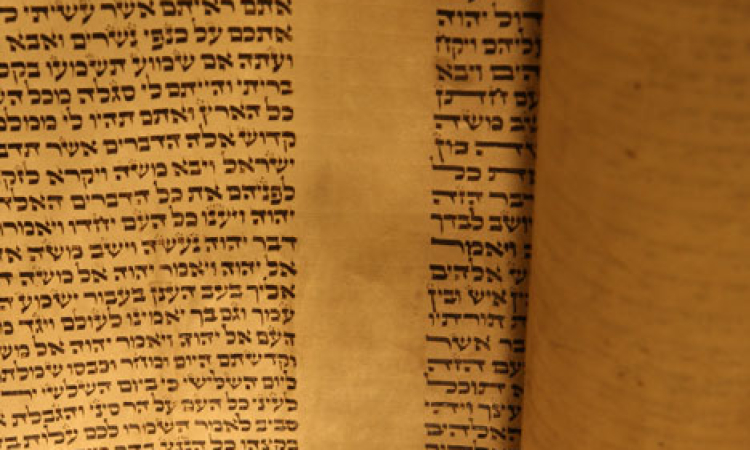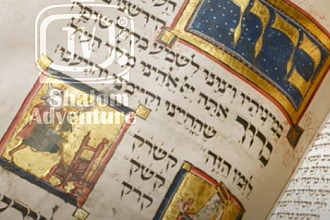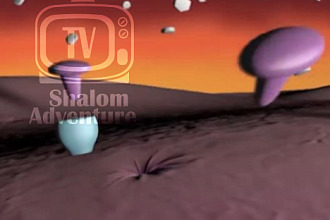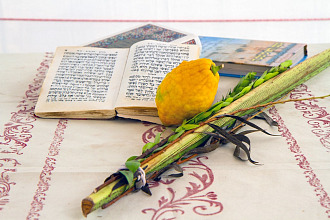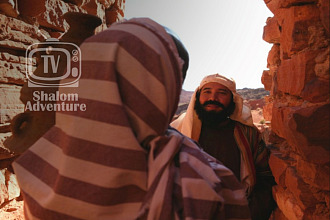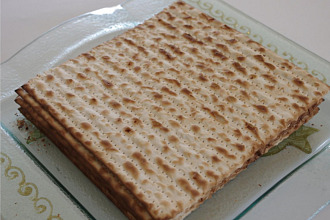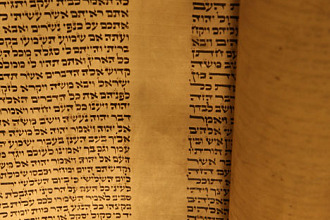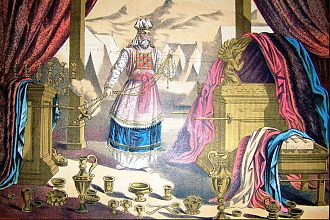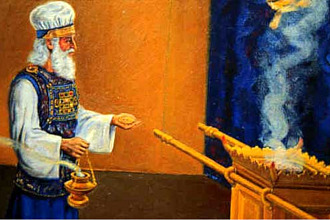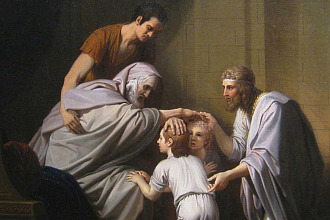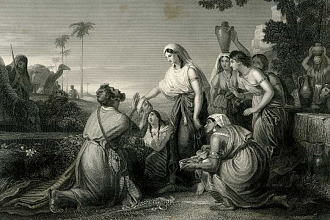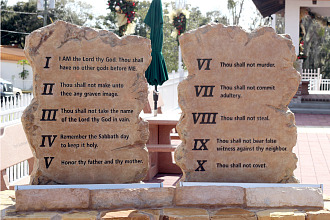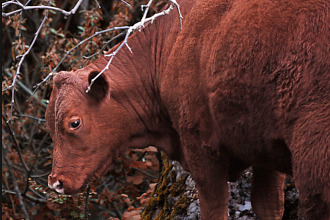Parasha for the Week: Va'era: Exodus 6:2 - 9:35
Haftarah for the Week: Ezekiel 28:25 - 29:21
Besorat Yeshua: Mark 14:22 - 31
Overview
G-d tells Moshe to inform Israel that He is going to take them out of Egypt.
G-d commands Moshe to go to Pharaoh and ask him to free his people.
Although Aharon shows Pharaoh a sign by turning a staff into a snake, Pharaoh’s magicians copy the sign, emboldening Pharaoh to refuse the request.
G-d punishes the Egyptians and sends plagues of blood and frogs, but the magicians copy these miracles on a smaller scale, again encouraging Pharaoh to be obstinate.
After the plague of lice, Pharaoh’s magicians admit that only G-d could perform these miracles.
Only the Egyptians, and not Israel in Goshen, suffer during the 7 last plagues.
The onslaught continues with wild animals, pestilence, boils and fiery hail.
However, despite Moshe’s offers to end the plagues if Pharaoh will let Israel leaves, Pharaoh continues to harden his heart and refuses.
“Softness and Tenderness”
The Torah states in reference to the plague of hail, “The wheat and spelt were not damaged, for they were late in ripening.” (Exodus 9:32)
Rashi, explains that since they were late in ripening, they were soft when the hail struck.
Thus, they were able to bend with the wind. This flexibility enabled them to bounce back.
Rabbi Chayim Mordechai Katz, taught in the name of Rabbi Yosef Leib Bloch, that a person needs to be very strong in his principles and ideals -- so strong that no power on earth could make him veer from the truth and his values. However, the way to do this is to be like the reed -- to be soft and flexible, kind and gentle when talking with others. A person who is obstinate and inflexible might appear stronger, but he is like a cedar tree. In a strong wind, unlike the bending reed, the cedar is either uprooted or broken in two. Softness and gentleness combined with persistence in keeping one’s principles is the approach that will be victorious in the end.
"Paying Attention or Not"
Moshe warned Pharaoh and the Egyptians that there was going to be a devastating hail that would destroy living creatures remaining out in the open. The Torah states, “Those who feared the word of the Almighty from the servants of Pharaoh brought his servants and his cattle into the houses. And those who did not pay attention to the word of the Almighty left their servants and cattle in the field” (Exodus 9:20-21). What can we learn from these two responses?
The Torah does not state that there were people who did not believe that Moshe’s warning was true. Rather, the Torah states that they did not pay attention. From here we see that the opposite of fearing the Almighty is not paying attention.
According to Rabbi Packouz, “all the knowledge in the world will not help a person keep away from danger unless he takes that knowledge to heart. For this reason there are plenty of people who do things that could greatly endanger their spiritual and physical well-being. They do not take the dangers seriously. Lack of paying attention to dangers will lead to all kinds of impulsive behavior that will have painful and damaging consequences.” The Talmud (Tamid 32a) teaches that the wise man is one who sees the future consequences of his behavior.
"Others"
In speaking with Moshe, the Almighty says: “Also, I have heard the outcry of the Children of Israel.” (Exodus 3:7). What do we learn from the seemingly superfluous word “also”? Rabbi Moshe Sofer, author of Chasam Sofer explained that “also” indicates that not only God, but the people also hear one another’s cries. Even though the entire Jewish people were enslave and afflicted, they did not forget the plight of their fellow man. According to Rabbi Pliskin: Never say to someone, “I have my own problems. I don’t want to hear about yours.” If two people are in a hospital, each should take an interest in the other’s condition
"Sufferings"
The Torah states: “And Pharaoh sent word and summoned Moses and Aaron. He said to them, ‘I have sinned this time. The Almighty is righteous. I and my people are wicked! ... I will let you leave. You will not be delayed again.’ “Shortly thereafter, Pharaoh refused to let them leave. Why did Pharaoh change his mind once the pressure of the plague was removed? Rabbi Noson Tzvi Finkel explained that Pharaoh viewed suffering as a punishment. That is why he said, “The Almighty is a righteous judge and His punishment is fair because I have done evil.”
The reality is that there is a strong element of kindness in the suffering that the Almighty allows. In part, it is a divine message that we have something to improve. The goal of suffering could be to motivate a person to improve his behavior. Pharaoh viewed suffering only as a punishment. Therefore, as soon as the punishment was over, he changed his mind and refused to let them leave. Our lesson: View suffering as a means to elevate yourself and you will find meaning in your suffering. Try to accept it with love and appreciation. While there is still pain involved, it is much easier to cope. Whenever you find yourself suffering, ask yourself, “How can I use this as a tool for self-improvement?”
“Care for Others”
When Rabbi Dov Bairish Wiedenfield, heard that his wife died, he felt deep anguish. Immediately afterwards, however, he asked about the welfare of the other woman who was hospitalized in the same room. He expressed his hope that the death of her neighbor would not aggravate her illness.
“Value of Others”
The mother of Rabbi Simcha Zisel Ziv had a custom to collect money for the poor at funerals. At the funeral of her only daughter, she also collected charity. When asked how she was able to compose herself in the summit of her grief, she replied, “Just because I am suffering doe not mean that the poor have to suffer also.”
HAFTARAH: Ezekial 28:25 – 29:21
Parasha: In the book of Shemot, Exodus, the peo¬ple of Israel are scattered in Egypt… The Egyptians became ruthless in imposing tasks on the Israelites, and made their lives bitter with hard service in mortar and brick and in every kind of field labor. They were ruthless in all the tasks that they imposed on them. (Exodus 1:13-14).
Haftarah: Ezekiel establish a strong parallel be¬tween the people who oppresses Israel and Egypt and is invited to prophecy against the Pharaoh of Egypt: “Mortal, set your face against Pharaoh king of Egypt, and prophesy against him and against all Egypt; speak, and say, Thus says the Lord GOD: I am against you, Pharaoh king of Egypt.” (Ezekiel 29:2-3) Therefore, thus says the Lord GOD: “I will bring a sword upon you, and will cut off from you human being and animal; and the land of Egypt shall be a desolation and a waste. Then they shall know that I am the LORD. Because you said, “The Nile is mine, and I made it.” (Ezekiel 29:8-9)
Parasha: Moshe announces to Pharaoh that the country will be cursed by plagues: The Egyptians shall know that I am the LORD, when I stretch out my hand against Egypt and bring the Israelites out from among them.” (Exodus 7:5)
Haftarah: Ezekiel make a link with the 40 years of Israel in the wilderness: I will make the land of Egypt an utter waste and desolation… No human foot shall pass through it, and no animal foot shall pass through it; it shall be uninhabited forty years. I will make the land of Egypt a desolation among desolat¬ed countries; and her cities shall be a desolation forty years among cities that are laid waste. I will scatter the Egyptians among the nations, and disperse them among the countries. (Ezekiel 29:10-12) However there is a hope, there is a future even for Egypt or any nation who oppressed Israel if they re¬pent: Further, “thus says the Lord GOD: At the end of forty years I will gather the Egyptians from the peoples among whom they were scattered.” (Ezekiel 29:13)
Besorat Yeshua Mark 14:22 - 31
Parasha: Israel is in Egypt, oppressed by the Egyptians and Moses is preparing the Exodus which will be celebrated by the feast of Passover. “Then Moses stretched out his staff toward heaven, and the LORD sent thunder and hail, and fire came down on the earth. And the LORD rained hail on the land of Egypt.” (Exodus 9:23)
Besorah: Yeshua celebrate the Passover with his disciples one day before the official date, because he knows that this feast is the last one, in this one Yeshua will fulfill his mission of being the Lamb of God who takes away the sin of the world! (John 1:29): “Then he took a cup, and after giving thanks he gave it to them, and all of them drank from it. He said to them, “This is my blood of the covenant, which is poured out for many.” (Mark 14:23-24)
Parasha: We know that even among the Israelites, not all of them believed in God and were ready to follow Moses. When they finally followed Moses out of Egypt they were not supportive of the prophet. “A mixed crowd also went up with them, and livestock in great numbers, both flocks and herds.” (Exodus 12:38) “The rabble among them had a strong craving; and the Israelites also wept again, and said, “If only we had meat to eat!” (Number 11:4)
Besorah: Yeshua announces that a hard time will come even for the disciples: “You will all become deserters; for it is written, ‘I will strike the shepherd, and the sheep will be scattered.’ But after I am raised up, I will go before you to Galilee.” (Mark 14:27-28).

